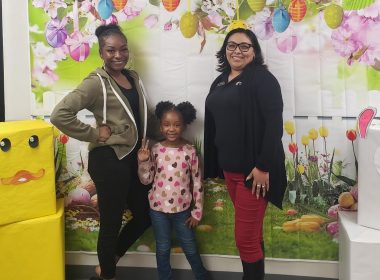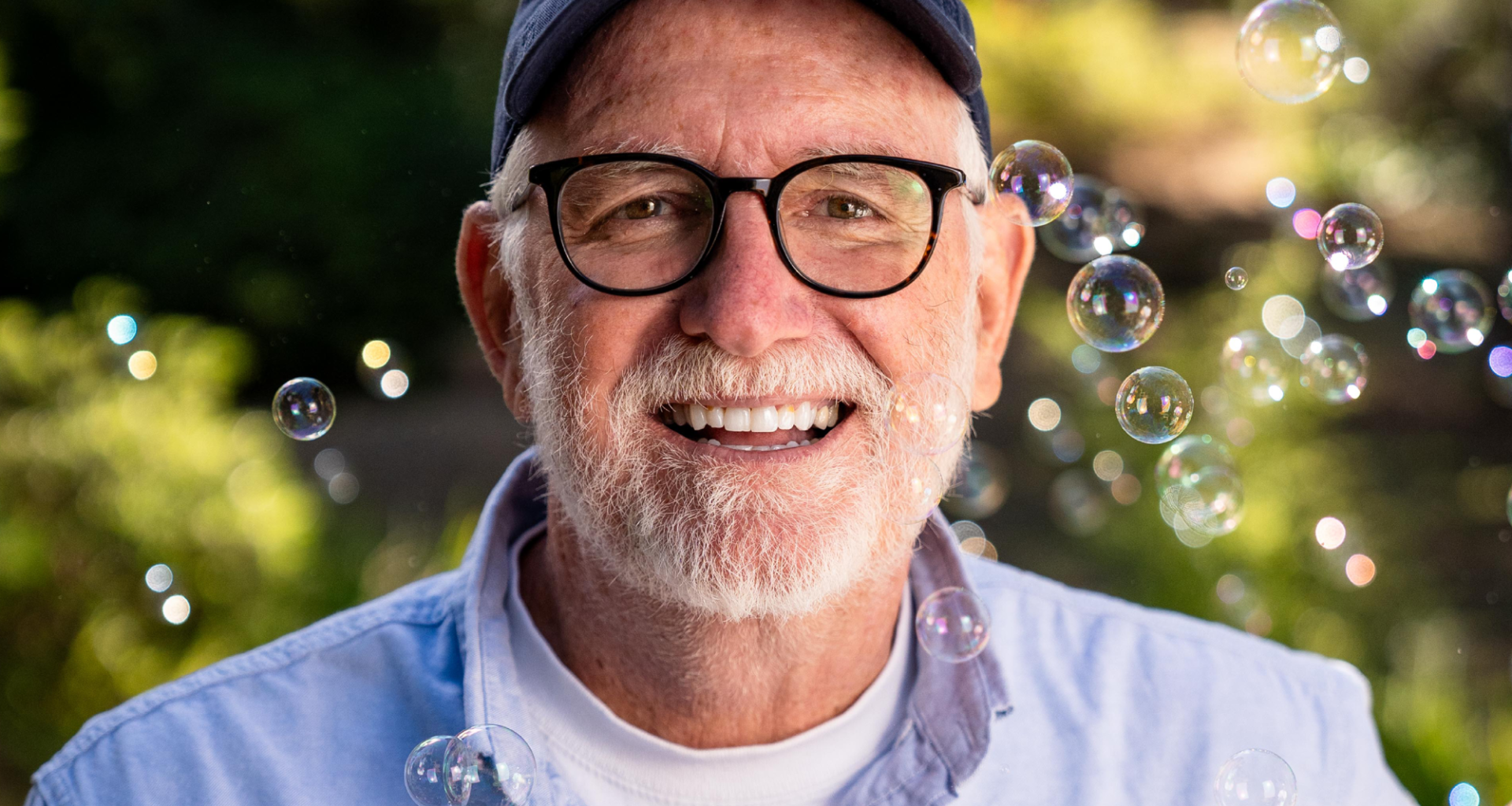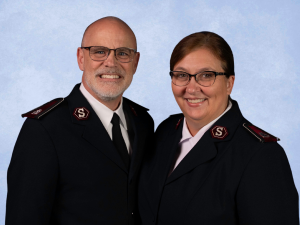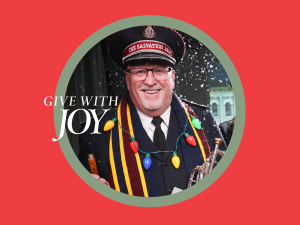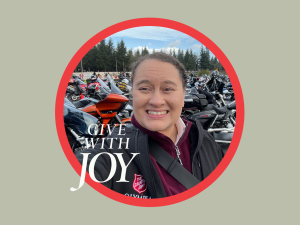What better time to talk about whimsy than right now?
Everything feels a bit more whimsical this time of year. And maybe you’re after a little more of it?
As bestselling author Bob Goff will tell you, we can’t catch what we don’t chase.
Which is why he’s out with a new devotional next week called “Catching Whimsy: 365 Days of Possibility.”
In it, he offers daily thoughts to help you chase after a more meaningful life, experience a more engaged faith and approach the challenges that will likely come your way with greater intention and confidence than perhaps you have experienced in the past. And with a short daily entry, it’s an adventure to last you a full year.
Bob spent decades as an attorney, became the Honorary Consul to Uganda, and gave up his law firm to pursue writing and speaking full time. He’s a New York Times bestselling author several times over, runs a popular weekly podcast, and will tell you life is too short to just go through the motions.
Whimsy, he says, shows up as joy and hope and generosity and selflessness and endless amounts of curiosity.
And some things, like whimsy and wonder and passion and the ability to give and receive extravagant love are worth catching. You might be just a decision or two away from a more beautiful and winsome life.
Show highlights include:
- What Bob Goff means when he says, “Every day we get to choose whether to give the microphone to hope or fear.”
- Why he chose to focus on whimsy in writing this book.
- The deliberate nature of finding joy.
- When he saw the idea in action that kindness, not qualifications, is what outlasts us.
- When simple curiosity led him to an unexpected opportunity to make a difference.
- How his understanding of loving others, of doing good, evolved from his early work with “Love Does” to now.
- The role stepping outside our comfort zones and breaking free from our mundane routines plays in catching whimsy.
- A tangible way to embrace deep purpose with playfulness today.
Listen and subscribe to the Do Gooders Podcast now. Below is a transcript of the episode, edited for readability. For more information on the people and ideas in the episode, see the links at the bottom of this post.
* * *
Christin Thieme: Good to have you, Bob. I’m glad you’re here. What is giving you hope recently?
Bob Goff: There’s a great definition of faith. It’s in Hebrews 11:1. It says, “Faith is confidence in what you’re hoping for and assurance in what you haven’t seen.” I would say that is a great description of how I make my way through each day, just confidence in what I’m hoping for.
I’ve got these concentric rings, you probably do too, and people listening do as well. You have in the middle if faith guide your steps, you’ve got your faith around God, and then some hopes for that it will go deeper, that it’ll be more evident. It won’t just be a collection of ideas or doctrines that I believe, but it’ll actually turn into something. This is like Paul, Colossians 5:6: “The only thing that matters is faith expressed in love.” So my first hope would be I’d express some of these things I say and believe in and the way that I interact with people. And not just the easy people. Christin, you’re low-hanging fruit. You’re super easy to get along with. But somebody who’s a little bit more prickly, what do you do when there’s somebody who’s actually difficult?
Then the second ring of hopes that I have would be for sweet Maria and the people we made and the people they married and the people they made. I’m a grandfather of four and maker of three, and father-in-law of three more. So that makes me a pastor of a church of 12. We are small, but we are mighty.
Then you could say the next ring of hopes I have would be for a collection of friends, except really close friends, the ones that know what’s going on in your life. And then there’s everybody else, the acquaintances and people you meet. You wish them well on their journey. But I’d say most of my time is spent, and probably for most of us, in those first three or four rings. And we don’t get out to sometimes with whatever the issue of the day is. People will say, “What’s your position on whatever?” And that would be ring 50. I don’t know. I’m just working on the first couple rings of my life, faith, family, friends.
Some of the hopes I have involve inviting people into a little bit deeper water, to just say, “What would happen if you pushed out a little deeper in your faith? What would happen if you pushed out a little deeper against some of the fears in your life or the rules you’ve made around your life?” So that lights me up a little bit too.
Christin Thieme: Love it. Along those lines, I’ve heard you say that every day we get to choose whether to give the microphone to hope or fear. What do you mean by that?
Bob Goff: Yeah. I get the opportunity to serve as the consul for the Republic of Uganda, which cracks me up. I’m actually their diplomat to the United States, although I don’t look very Ugandan. But the thing I’ve learned about Ugandans, and it’s not just Ugandans, but it is particularly Ugandans, is that when you give them the microphone, it’s their microphone. Your clothes will go out of style. Seasons will change. You will never get it back. And so the whole idea is you hang onto the microphone when you’re interviewing friends from Uganda. Because when you let go of that microphone, who knows how it’s going to turn out.
So the idea of hanging on and giving hope the microphone. Sometimes when we give fear of the microphone, then it just runs amok. It just starts saying, “Oh my gosh this, and oh my gosh that.” And you start catastrophizing. Or, for some of the people I know, and I would be one of those, I’ll minimize things. I could lose my left arm and it’d be like Monty Python, like, “Get back here. Fight me with your right.” I minimize things that are a big deal. And so whether you catastrophize or minimize, if we’re clear on what we’re hoping for, it tends to bring us back to the center. It tends us bring, what are we really, really hoping for? And sure, I’m hoping for world peace, but I’ve got a lot more refined than that. I’m hoping for these kids in our school, in Cana, in Galilee. I have some hopes right now in the Middle East. I’m hoping in our girls in the school in Afghanistan. I’ve got some really specific hopes for them.
Christin Thieme: Why whimsy? Why did you focus on whimsy for this new book?
Bob Goff: I think we got away from it. We started making loving people a lot more complicated than Jesus made it. We got so wrapped around some of the things, people’s behaviors, that we forgot about these underlying needs that we each have, and that sometimes the behavior is because you have this unmet need underneath it. And so what I want to do is get back to a simpler version. This is Jesus talking to his friends. He said, “I’ll tell you the truth. Unless you change and become like a child, you’ll never enter the kingdom of God.” Now, a lot of people were raised thinking you just pray a prayer, but evidently there’s more. It’s a childlike faith, and some of us traded that in for a childish faith, like we’re just doing silly things.` And silly things isn’t whimsy. Whimsy isn’t just unicorns and confetti and glitter. Instead, it’s this idea thinking, “Well, I wonder what would happen if,” and then finish the sentence. It’s that hope of confidence what you’re hoping for, assurance in what you haven’t seen.
We were in Africa last week to buy giraffes, and the reason we were there to buy giraffes is that we have a school and we’re putting in a giraffe habitat next to the school. And so you think, “What does that have to do with anything?” It has everything to do with everything. And it wasn’t just finding animals that don’t bite people and would be hard to lose, although that is true of giraffes. It’s saying there’s a whimsy factor in it. A kid that grows up in a village in a hut who the giraffes used to wander everywhere in northern Uganda, but you’ll find a total of zero in northern Uganda right now. And I thought, “Well, we can bring them back. We will just get a boy, a girl, and play some white music and see what happens.”
Christin Thieme: There you go. Oh man, that’s so fun. I love it. So “Catching Whimsy,” the title of that suggests that it’s not accidental, right? It requires some intentional pursuit. What led you to this insight about the deliberate nature of finding joy, of catching whimsy?
Bob Goff: To your point, you don’t get adopted by accident. You wouldn’t end up with a child and say, “Where did this come from? “You don’t go out on a date by accident. Actually, there’s something that you actually do. You say, “I’m in.” And sometimes people live out their faith by accident. They stumble into things, which is fine. But what would happen if you were really intentional when you’re a kid and you blow a bubble and then you catch it on the end of the wand? There’s something about that. I want to get back to the earliest, simplest, not easiest, but simplest version of our faith. Because faith isn’t easy; it’ll kill every previous version of you. And I’m glad it does, because it makes room for the new, the new creation.
But that idea of to say, “Let’s find a simpler way to explore these things, but in intentional way.” Most of the guys I went to college with were pretty hapless. They’re probably still pretty hapless. They’re just kind of wandering around not very self-aware, or not very aware of any anybody’s feelings. They’re not aware that there’s other people. There’s just them. And so what I want us to do is get our head on a swivel, look for opportunities to put some legs on the stuff that we believe, and not with militants and not just signing a petition, but to actually with resolve and with action to actually do something about it.
So instead, we have a whole lot of commentators of people on social media commenting on everybody else’s whatever they agree or disagree. I’m like, “Why don’t you live such an engaged, whimsical life that you don’t have time to get on there and comment on everybody else’s life? What if you live such a curious life that you’re not comparing yourself to other people? You’re just so curious about how are they making this happen?” I don’t envy them. What a great example of somebody doing something and say, “I wonder what I could do.” This is whimsy. We’re not trying to be normative. We’re trying to bring an unreasonable amount of joy, an unreasonable amount of anticipation in some really dark circumstances.
In a former life, I was a trial lawyer. Could you imagine that? Could you imagine me being your lawyer? Would that make you want to settle the case? So I think what we do is instead of living in to the caricatures of who we are, what if we just figure out who in the world we are? Literally figure out who in this world am I? What is my role to play? And it takes kind of a mature faith and some focus concentrated. And so again, this idea of whimsy isn’t all just yippy, skippy. It’s actually a veneer of happy, but a mile of strategy.
Christin Thieme: Can you give an example of some story or person or way that you’ve seen this play out?
Bob Goff: Well, we’re talking about giraffes now, but we were talking 20 years ago in Uganda in the middle of this decades-long insurgency. It was just a nationwide civil war. The Lord’s Resistance Army had abducted 40,000 children, had given them machine guns, and put them in front of their soldiers so that the children would be the first ones to be taken. And amidst of all of that, we thought there’s a whole country, millions of people, 17 million people that are without schools. So we said, “Let’s open up a school.” My worst subject in school was school, so I didn’t know much about schools, but I thought, “Well then, let’s start this thing.” And so we told hundreds of thousands of Ugandan families that we’re starting a school, it’s free, just show up. On opening day, we had nine kids, and I think eight of them didn’t want to be there.
But the idea is that you start, and now the nine turned into 19 and 29 and 59. And now there’s 1,500 kids at the school, and we’re building a university, and that’s where the giraffes come in. A university would be just kind of like this, I don’t know. There’s nothing that just lights me up about a university. But the idea that you could have a zoology major, that you could train the people that run the wildlife. There’s 2,740 giraffes in all of Uganda, but none of them are in the north. So we bought a square mile. This isn’t just like brain candy. We just started buying the land. Now we’re going to build a big wall so they don’t… I mean, I guess you could AirTag a giraffe, but it would be better to keep them inside the walls. And then we’ll take the next step.
And so for me, that idea of whimsy, it’s cumulative. It’s saying, “What if we, what if we, what if we, what if we.” It isn’t to draw attention to yourself. Because we say, “What if we do this and have matching hoodies? Or what if we have this big campaign and we do that?” That is more self-directed, and that isn’t always bad. It can draw attention to things. But what if we did something that would just be awesome and the kids that would benefit from that wouldn’t even know our names, nor would it matter? And I love that idea. I think that’s when we get to heaven that we’ll figure out those things. That’s why eternity lasts so long, that you’ll probably have all these encounters with people who are like, “So you’re the guy. Why giraffes?” I’m like, “Oh my gosh, pull up a chair. Lend your wing to me. Let’s talk.”
Christin Thieme: That’s right. I think we talk a lot on the show about doing good and about how even the tiniest of actions can add up to make a big difference. I think we talk to people like you who are building a school in Uganda. It’s amazing, these big billboard accomplishments that I think sometimes it can be easy for people to say, “Well, I could never do that.” What have you noticed about the kind of people who take action? What is it, even if it is small, to get to those bigger ideas? What do you think about that?
Bob Goff: Yeah. Well, we think up into the right. Like we were saying, “We used to have nine, and then we had 19, and now we have 1,500.” But God’s economy is not that. He was always down into the left to say, “If you want to meet me, find hungry people, thirsty people, sick people, strange people, naked people, and people in jail,” people that are all down into the left kind of experiences. And so he said, “That is where I hang out.” So we often put him in the winner’s circle and there’s the big touchdown and somebody takes a knee and points towards heaven and said, “And that’s great.” Glory to God in all circumstances. But he said, “While I love everybody equally, I am always with hungry, thirsty, sick, strange, naked, in jail.”
It sounds noble to go across an ocean, but it actually isn’t Scriptural. The only two instances in the Scriptures where somebody went across an ocean, Paul got shipwrecked, and Jonah, you know how that turned out. What we want to do is go across the street. And so it isn’t just the small thing, it is the small thing. Love your neighbor. He didn’t say, “Go three continents away and do whatever.” He said, “Love your neighbor right there.” So bake them a cake. If they don’t want the cake, I do. I’ll get you my PO box. But find those small gestures. Those selfless acts of love are each declaration of faith. This is what I actually believe is true.
And the ones that nobody knows about are the best ones. The people that are going to really have trouble in heaven are guys like me. Because I’ll tell Jesus, “Hey, remember the time that we started the school?” He’s like, “Yeah, I read the book.” And then I’m like, “Oh no, there’s the other time of the draft.” He’s like, “Yeah, I heard the podcast.” But what if you do something and be secretly incredible? Don’t tell anybody. Just go do awesome things because they’re awesome things. And then all of the Scriptures that said, “God did this and this and this,” and always the punchline is so no one would boast, but we’d boast about the Lord, that people would see your good works and give credit to God. That’s the whole ending. That’s the culminating story with the city on the hill and not putting lights under bushels and all that. The whole idea isn’t so that we would get the bushel off and say, “Here I am.” It’s so the people would see the good things and give credit to God.
Christin Thieme: Yeah, absolutely. I loved in your bio, I read that one of your greatest ambitions in life is to love others. I love that you include that in there. How has your understanding of loving others evolved over time, and even from your early work with Love Does to now?
Bob Goff: Oh, I’m just a beginner. I have training wheels. Ask the people closest to me. Ask Stephanie. Ask the people I work side by side. I’m such a rookie at this. I get it wrong more often than I get it right. And yet, you can still move in that direction to say, “I’m trying to learn.” And despite all of my little picadillos and insecurities and inaccuracies, that we’re moving in this direction of loving people better. Instead of bailing and saying, “Well, I blew it there so I must just disqualify myself,” but instead we said, “Yeah, I blew it there. Maybe there’s something I have to learn. Maybe I can do a better job next time.” And so the whole idea of saying maybe taking a longer view of your life to say, “What are you going to be remembered for?” Because most of us are known for our opinions, but we’re remembered for our love.
What a great time before you get as old as me at 65 to start working on that legacy of love. Just start working on it now. With each little thing that you do, not making a big deal about it, but just saying consistently, “I’m just going to try to show up as best I can.” And then if you have one reaction, sometimes maybe keep that with you and a close friend that you might say, “My immediate thought was.” But for outward, you don’t need to do this constant streaming of everything, every random thought that comes in your mind. Maybe just shut up every once in a while if there’s something really beautiful. If I was to add verse to Scripture, it would have something to do with that. I was just like, “Just be quiet.”
Christin Thieme: Could be helpful.
Bob Goff: Be still and know God.
Christin Thieme: There you go. So where does stepping out of our comfort zones come into play and breaking free from some of those? I mean, all of us have our daily routines that we go through each and every day. When it comes to “Catching Whimsy,” how do we find more of it?
Bob Goff: I want to say, I’ve just caught on the phrase comfort zone. I’ve heard that, as have you, but I’m just like, “I’ve never gone to a comfort zone.” Wouldn’t that be great? We could open those up along the highway, comfort zone.
Christin Thieme: Yeah, that’d be nice.
Bob Goff: I don’t know if this would be back rubs or Dippin’ Dots or what it would be that represents that, but I think you and I could retire. We could just say, “We’re going to open up comfort zones along the way.” And then the question is, “What would you put in it?”
Christin Thieme: Definitely ice cream.
Bob Goff: And I would say for most people, it’s what’s familiar to them. So I would say I would substitute in familiar. And the problem is that we sometimes get so wrapped around what we’re familiar with, that we don’t have an opportunity to see what we’re capable of. And so I want to say, as a trial lawyer, I could still be a trial lawyer. I was pretty good at it and I liked it. And if you want to make bank, I’d open a Chick-fil-A. But the second choice would be a trial lawyer and win. But that wallets familiar didn’t feel like that thing that was going to leave the legacy I wanted to leave. So I just bailed. I’m just like, “I’m out.” I quit stuff on Thursday. It was a Thursday. I quit my own law firm. I got everybody together in the biggest conference room we had/ I took the key off my chain. I gave it to this kid that worked for me for over a decade. I said, “It’s all yours, man. You don’t owe me a penny.” And I left. I’ve never gone back. It’s like, I don’t even know if my name’s on the door. I hope it’s not if he messes up.
Christin Thieme: That’s the ultimate mic drop.
Bob Goff: It is. It’s like, “And done.” And that was a really awkward conversation that evening to have with sweet Maria. She said, “How was work?” I’m like, “Work?” She’s like, “No.” I’m like, “Yes, we’re unemployed.” It was awesome.
Christin Thieme: So this book, do you see it as a daily tool for personal growth? If somebody picks it up to use over the next year, how can they best incorporate it into their life?
Bob Goff: The reason I wrote it in the way that I did is it would be a daily reminder. Just like a tap on a shoulder from a safe friend; not pointing bony finger in your direction. But just saying through stories, and that’s what it said in Matthew 13, that Jesus never spoke to anybody without telling them a story or two. And so I’ve just put together 365 stories. Oh, plus leap year, so 366 stories that there’ll be an experience that isn’t just my experience. My hope would be the reader would read that and would onboard their experience. We’ve always had a difficult circumstance, or a time where ambiguity was like, “Do we do this or do we do that?” And so it might be a sentence or two about a time where something ambiguous came. But then the hope would be that if faith guides their steps that they’d read a Scripture that might tie into that concept, and then we would land the idea. So here’s what to do today. What if you were to try to do this when that happens?
My hope is that it would be this daily reminder. I don’t have quiet times; mine are really loud. I take everything I’m learning and I check it against Scripture. I say, “Is that just me thinking something swell or [inaudible 00:21:15]? Or is that actually consistent with some of the things that I believe the most?” And so this is the compilation of all those things, all those seemingly random thoughts and ideas, but formed around these ideas that I think are really practical. They’re really like, where we live. What do you do when you feel misunderstood? Or how about the betrayal, which is kind of next level of feeling misunderstood. That they misunderstood you, but then they also did something kind of rotten. And what do we do about that when you’re supposed to love your enemies? And they’re really not my enemy, truth be known; they were my friend, or I thought so. And so what do you do? I’m hoping people will get some encouragement.
It’s like, I’ve seen these marathon runners and there’s a table out with a bunch of Gatorade cups. Some people grab it and throw it over their head. Some people drink it. Some people spill it on the way and crush the cup and throw it on a lawn. I want to just set up a Gatorade stand. I want people to get what they need. I think it’s a big table full of a lot of ideas, and I hope somebody will connect with some of them.
Christin Thieme: Love it. If anybody can’t tell, your approach combines deep purpose with playfulness, I would say. What is one tangible way somebody listening could embrace that combination today in their own life?
Bob Goff: Oh yeah. Go invent something. Go make a solar oven in your backyard. If you’ve got a family, say, “We’re going to live off the land. In three weeks we’re going to live off the land for a day, which means we better plant those radishes now, because unless we were going to eat grass.” Like that whole idea to say, “Or this is going to be our free day. We’re going to go to a Costco and we’re going to get all the samples.” And then what we’re going to do is we’ve got a SeaWorld nearby. You can get a shopper’s pass that lets you get in for free for one hour. But if you’re there for an hour and a minute, they ring it up on your card, which is like $100. And I wouldn’t want to spend $100 watching a big fish eat a small fish.
So what I would do is I would incorporate some of the things with the people that you care about the most, and I would get out there and do it. And then I would take notes. I’m kind of a note taker. I think you are too. If you want to live a noteworthy life, take notes on it. What are the stuff you’re learning? How are you learning it? Why did that matter? What are you going to do with it? That kind of an engaged life, you will never compare yourself with somebody else because you’ll be so busy tending to your fire that you won’t waste any time tending to somebody else’s fire.
Additional resources:
- If you are one of the hopefuls, get on the list for the Do Good Digest, our free 3-minute weekly email newsletter used by more than 20,000 hopefuls like you for a quick pick-me-up in a busy day.
- Read “Catching Whimsy: 365 Days of Possibility” (Thomas Nelson, 2024) by Bob Goff.
- If you are enjoying this show and want to support it, leave a rating and review wherever you listen to help new listeners hit play for the first time with more confidence.
- If you want to help The Salvation Army serve more than 24 million Americans in need each year, give today. Your gift of money, goods or time helps The Salvation Army do good all year in your community.
Listen and subscribe to the Do Gooders Podcast now.



